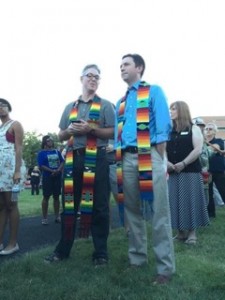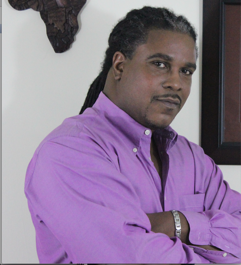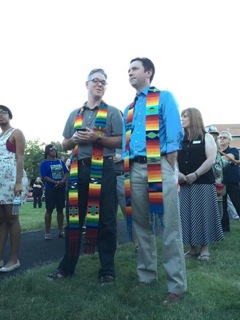Discontents and Their Intersections – Eric A. Thomas
 Today’s post flips the original title of the first post of this series Intersections and their Discontents to consider the inclusionary and ecclesial promises of the rainbow – the perennial sign that God is indeed with us, with the intersectional realities of people of color, and particularly LGBT people of color. The implications are complicated, multi-layered and messy, made even more so in context to what Presbyterian polity says about the Church and its Unity (F-1.0302a), the more contemporary confessions (Confession of 1967, Brief Statement of Faith, and the hopefully soon to be ratified Belhar Confession), and scripture that calls us to justice, to the bearing of each other’s burdens, to the “least of these,” and to the love of each other (e.g. Micah 6:8, Gal 6:2, Matt 25:40, John 13:34-35, Rom 12:1-21). The unfolding events of #Ferguson are illuminating or exacerbating (or both) what is at stake when we claim to be “the body of Christ.”
Today’s post flips the original title of the first post of this series Intersections and their Discontents to consider the inclusionary and ecclesial promises of the rainbow – the perennial sign that God is indeed with us, with the intersectional realities of people of color, and particularly LGBT people of color. The implications are complicated, multi-layered and messy, made even more so in context to what Presbyterian polity says about the Church and its Unity (F-1.0302a), the more contemporary confessions (Confession of 1967, Brief Statement of Faith, and the hopefully soon to be ratified Belhar Confession), and scripture that calls us to justice, to the bearing of each other’s burdens, to the “least of these,” and to the love of each other (e.g. Micah 6:8, Gal 6:2, Matt 25:40, John 13:34-35, Rom 12:1-21). The unfolding events of #Ferguson are illuminating or exacerbating (or both) what is at stake when we claim to be “the body of Christ.”
Over the past month the news of the Michael Brown shooting in Ferguson, MO has sent shock waves of emotions throughout the country and indeed the world. I observed how the narrative changed (thanks to certain media broadcasts) from “an unarmed man who was on his way to college was shot multiple times by a police officer, and left lying in the street”; to allegations that Brown tried to take a gun from a police officer, which developed into a story about Brown as a thief who lost his life for robbing a convenience store. The community protested and the police transformed into a militarized force before our eyes. I am still pondering the depth of meaning, the political ramifications, and the theological implications of Palestinian allies sending Ferguson protestors tips on how to survive tear gas attacks – use milk not water, make sure to run against the wind, don’t rub your eyes.
The Brown event in Ferguson became a kind of tipping point of resistance to an undeniable pattern of violence visited on unarmed African Americans by police officers, security guards, and citizen “vigilantes.” A mere two weeks earlier Eric Garner, a Staten Island father of six was killed by the illegal choke hold of a police officer on July 17th. John Crawford was shot and killed in a Walmart for holding a BB gun in a store that sold BB guns on August 5. Beatings of African American women by a state trooper in California and a campus police officer in Arizona made social media news.
Lest we believe that these are only African American issues, more videos began to surface about police attacks on unarmed Latino men, Native Americans, and yes, LGBTQ folks .
To say that it is “difficult” to be a person of color who is also a same gender loving Christian would be an understatement. When news of a violent attack or a murder of a member of our community comes, cries of outrage, anger, and frustration follow from those most directly affected. In these times, we look to our left and to our right, in expectation that our sisters and brothers in Christ share this outrage – because we are the body of Christ. However, it doesn’t always happen that way. Ferguson reminds me that the victories of the 10A ordination and marriage equality campaigns had their social origins in LGBTQ resistance to police harassment at the Stonewall Inn, and the many altercations with police that have ensued since then.
August 22nd marked the one year anniversary of the death of Islan Nettles, a black transgender woman who was beaten and killed by her “neighbors” for “walking-while-trans”. Protests for transgender women of color rarely (if ever) make national news, or capture the attention of the Church (with a big C).
The intersection of privilege and injustice is a busy and dangerous one in a culture where the refrains of “what’s the big deal,” or “can’t we just get past this and heal,” or “before we get ourselves all worked up about this, let’s just wait until we have all the facts” passive-aggressively remind us how fractured our relations with each other are. “In the end,” as Martin Luther King, Jr. famously stated, “we will remember not the words of our enemies, but the silence of our friends.” We will also remember the attempts of deflecting and minimizing our issues by the attempted focus on others: “Why aren’t black people as upset with black-on-black crime?” “Why is it always about race?” “Why was he wearing a hoodie and buying Skittles and Snapple at that time of night in the first place?”
National LGBT organizations in solidarity with Ferguson have not been afraid to cross that intersection. Where is Christian witness in a world that still sees race, gender, class, sexual orientation, geography, able-bodied-ness, and status among other cultural markers (the intersections of power and privilege) before seeing people as human beings? Outside of the once-a-year (if that) Martin Luther King weekend and Black History Month celebrations, where is the Church’s (with the big “C”) call for “justice to roll down like waters, righteousness like an ever-flowing steam” not only for the reports that make it to Fox News and CNN, but for injustice that happens every day in our times of Pax Americana?
Four or five days after the Michael Brown story broke, I read the comments of Landon Whitsitt, not in his role as Executive and Stated Clerk of the Synod of the Mid-Atlantic, but as a father and a friend. On August 14th he wrote the following on his personal Facebook page:
As one of my sons sat watching the #Ferguson coverage with me last night, through heavy sobs he asked me “What do we do?” I had to admit to him that I didn’t know.
This morning, the best answer I have is:
“Don’t look away. Remember that even though we don’t know anyone from Ferguson, they are our friends. Our friends will ask us to help, in some way, soon. When they ask, we need to be prepared to do whatever we can.”
For me, this was the promise of the rainbow at the intersection of race/class/gender/orientation/etc., (in)justice, and ecclesial relationship. The lesson that we cannot look away from injustice, the responsibility to do whatever we can, and that people in need are our friends – even and especially if we don’t know them, encapsulates the scriptural calls to justice, care of each other, and concern for the least of these. The lesson must then be embodied, made internal and physical, as in Landon Whitsitt and Brian Ellison, donning pastoral stoles to visibly participate in a peace rally in Kansas City (picture), or join other clergy including Pamela Lightsey, Fr. Marcus Halley, and others who blogged, and posted video, and organized supply initiatives in solidarity with the Ferguson protests. Fr. Halley helped to organize with three Episcopal Churches in Kansas City and Independence, MO to collect and distribute over 100 backpacks for Ferguson school kids in a project called #BackPacksforJustice.
This witness requires leaving the comfort of our computers and physical silos and actually engaging with real folks to work together for solutions. As J. Herbert Nelson, II, Director of the PC(USA) Office of Public Witness states, “The PC(USA), and indeed the Christian community, must recommit to the pursuit of and struggle for racial justice. Churches must provide a moral compass for the nation by getting outside their buildings, engaging in their communities, and shaping public policies that will move our whole nation towards justice, peace, and reconciliation for all people”.
As we work to keep the promise of the rainbow, let us be reminded that we are all individually and collectively equipped with the consciousness and the gifts to work in multiple ways towards justice for everyone, including, in the words of the Brief Statement of Faith,
“…to pray without ceasing,
to witness among all peoples to Christ as Lord and Savior,
to unmask idolatries in Church and culture,
to hear the voices of peoples long silenced,
and to work with others for justice, freedom, and peace. “
May the promise be kept – someday.
 Eric A. Thomas is a Candidate for Ministry under care of the Presbytery of Greater Atlanta, and is currently the Director of Christian Education at the First Presbyterian Church of Brooklyn. In addition, he is attending Drew University in pursuit of the PhD in New Testament, with a focus on the intersections of Queer Theory and Africana Studies. He was part of the General Assembly Special Committee on the Preparation for Ministry in 2014, a Theological Student Advisory Delegate (TSAD) in 2010, and is a board member of More Light Presbyterians. Eric is a graduate of the Johnson C. Smith Theological Seminary at the Interdenominational Theological Center (ITC) where he earned the Master of Divinity and Master of Arts in Church Music degrees. Prior to pursuing his call to ministry, he has worked in marketing and community engagement positions at the Brooklyn Academy of Music, Lincoln Center, and the National Black Arts Festival (among others). Eric is the proud uncle of two nephews and a niece; Jayden, Nia, and Devin.
Eric A. Thomas is a Candidate for Ministry under care of the Presbytery of Greater Atlanta, and is currently the Director of Christian Education at the First Presbyterian Church of Brooklyn. In addition, he is attending Drew University in pursuit of the PhD in New Testament, with a focus on the intersections of Queer Theory and Africana Studies. He was part of the General Assembly Special Committee on the Preparation for Ministry in 2014, a Theological Student Advisory Delegate (TSAD) in 2010, and is a board member of More Light Presbyterians. Eric is a graduate of the Johnson C. Smith Theological Seminary at the Interdenominational Theological Center (ITC) where he earned the Master of Divinity and Master of Arts in Church Music degrees. Prior to pursuing his call to ministry, he has worked in marketing and community engagement positions at the Brooklyn Academy of Music, Lincoln Center, and the National Black Arts Festival (among others). Eric is the proud uncle of two nephews and a niece; Jayden, Nia, and Devin.

